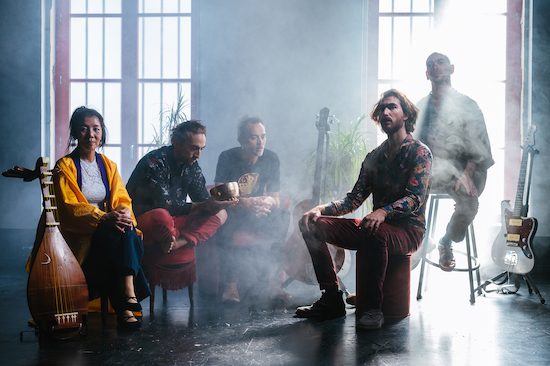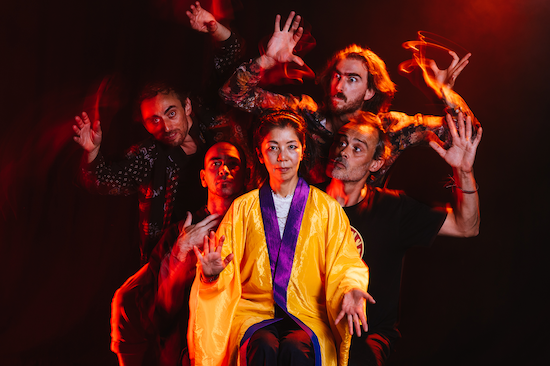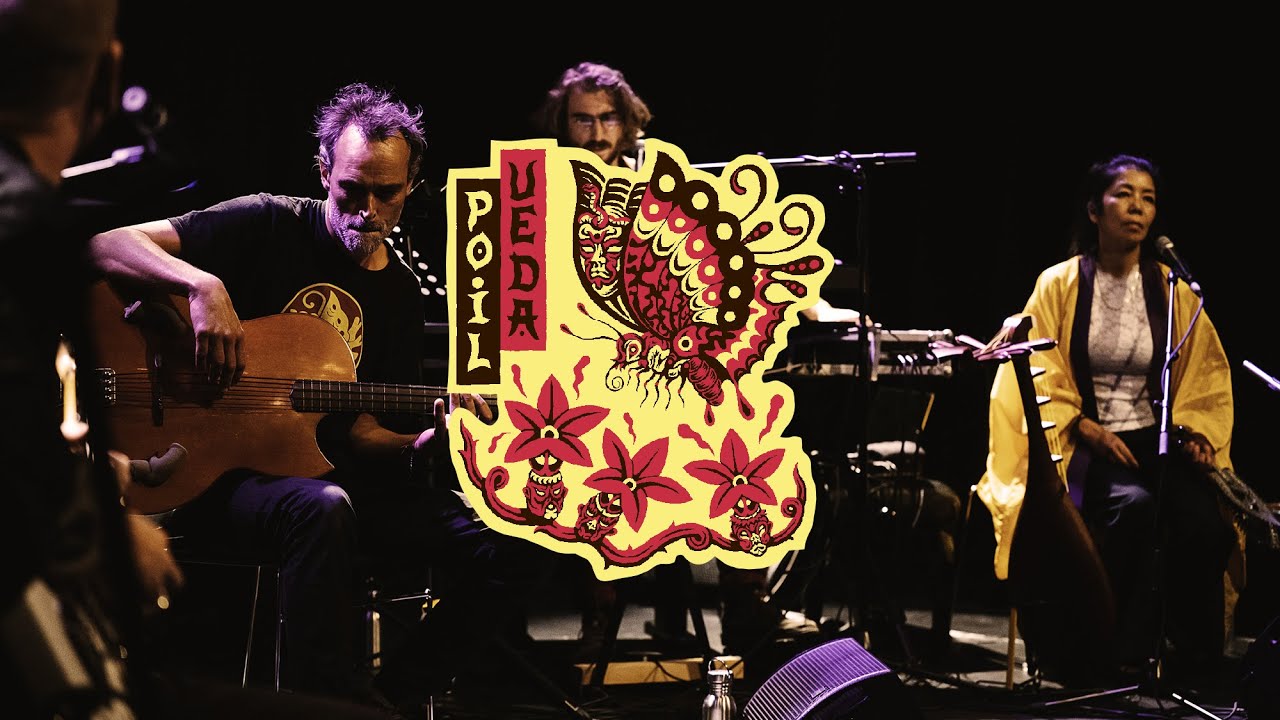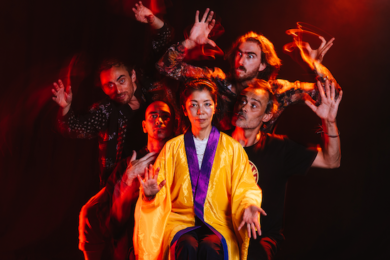Photos by Paul Bourdrel
Last March, Franco-Japanese quintet PoiL Ueda – a collaboration between French band PoiL and Japanese singer and satsuma-biwa (a form of Japanese lute) player Junko Ueda – released one of 2023’s most startling, singular albums. Then, in November, they did it again. Their self-titled debut combined shômyô Buddhist chants and Japanese storytelling, the two facets of Ueda’s usual work, with fantastically vivid and elastic progressive/psychedelic rock. Its follow-up Yoshitsune continued the saga that was brought to life so spectacularly in the second half of Poil Ueda, that of the 12th century Dan-no-ura sea battle between rival clans the Minamoto or Genji, led by their commander Minamoto No Yoshitsune, and the Taira (aka Heike) clan. On the second album, Yoshitsune has won the war but faces another enemy in the form of his own older brother, the general Yoritomo, and the furiously dramatic musical depiction of the sea battle – the soundtrack to an action-packed, technicolour historical epic that plays out in your mind – gives way to even knottier structures and a steelier, wintrier mood, more haunted than heroic.
I speak (in English) to Ueda and Antoine Arnera from the band, as they’re preparing for a show in Chalon-sur-Saône in France and looking ahead to an appearance at the Tremor Festival in the Azores, and they outline the difference between the two albums: “The first one is really about the Dan-no-ura, so it’s really strong, iconic music and also a famous story,” Ueda explains. “After this moment, we have lots of stories and maybe that’s why it’s more complicated,” according to Arnera.
If the alchemy achieved by Poil Ueda seems so unlikely, it isn’t just because Ueda and the members of PoiL hail from different countries. It’s also due to the very different musical cultures they have emerged from. “My music is Japanese traditional music. So I usually perform solo acoustic. And this is storytelling music, so there are many silences between the phrases. And it’s always a classical or chamber music-style concert,” Ueda says when I ask about the typical context for her shows. PoiL, meanwhile, are inextricably linked to a Lyon-based Dur Et Doux, a firmly DIY collective, label, live agency and haven for (mostly) local acts – the likes of Ni, Chromb!, Le Grand Sbam and Saddam Webcam – that frequently ally dazzling instrumental proficiency and compositional seriousness with visceral excitement and a powerful sense of the absurd.
“At the very beginning we started with a Nirvana cover and Chopin,” Arnera recalls. “After that we started to write some compositions. Boris [Cassone, now on guitar and vocals] was playing double bass, and I played an acoustic piano. But progressively we started playing more rock because our energy required it.”
For all the factors that apparently separated PoiL and Ueda at the outset, it soon becomes apparent that there were underlying affinities too. Talking about the music that made an impression on her growing up, particularly outside the classical tradition she performs in, it’s clear that Ueda already possessed keys to accessing PoiL’s sound. “When I was a child, I was doing Japanese traditional dancing. So I used to listen to Japanese traditional music. But after that, I started to play piano. It was very popular to play and learn piano, and I entered the conservatoire to study classical piano and later composition. But I liked 70s British rock, Emerson Lake & Palmer I loved very much. I listened to that a lot! And the keyboard player Keith Emerson very much inspired me to play piano.”
Meanwhile, PoiL had already been writing “some music with a kind of Japanese style but without knowing anything about it. We had this idea with Guilhem, the drummer, to meet some singers from Japan, and the first person we came across was Junko, by asking some friends. Finally I wrote her an email, and fortunately she said, ‘Oh, yes, maybe here we can try something. I like your music or I’m interested in it.’ And so we met in 2019.” This was, of course, shortly before Covid-19 hit. “We couldn’t rehearse together. So we started writing music around her music. Junko sent some storytelling about Yoshitsune and Buddhist shômyô chants, we composed our music around these songs, and it fit.”

Were they surprised how well their two worlds meshed? “Yeah,” says Ueda, “I was really surprised because quite a few times I’ve been asked by composers, ‘Can I write music for you, with your voice and instrument?’ And many times their first question is ‘What is the scale of your instrument?’ And what’s the voice range, what kind of tonality and harmony, which is quite far from my instrument. So I always hesitate a little bit, to talk about these scales, because then you’re thinking about the Western way, like a piano scale. But this instrument, or singing style, is a completely different concept. But the first time [PoiL and I] met they didn’t ask me anything about that. It was just, ‘Oh, ok. This music, we got it.’ And I was waiting to see what would happen, and it appeared to fit. Amazingly. And I was thinking, ‘Why is it like this?’ Because in Japanese traditional music, the timing is very important. For example, for my music, there’s nothing written about the rhythm or timing, you have to learn from your feeling and from your teacher, so the teacher plays for you and you have to remember it. First you start to try to imitate this timing, but gradually, you get your own timing. This timing is the most important thing in my music. Not a beautiful phrase, or beautiful singing or playing, but timing. And in their music, they got this timing quite well. And then I didn’t have any hesitation. Very soon I was able to flow with their music. And that was very amazing.”
Ueda doesn’t just flow with PoiL’s music – she soars over and swoops through these tricky compositions with ease. Nevertheless, playing with a rock band hasn’t been without its challenges. “Now we are doing tours, going club to club, spending 10 days in the van. You just get up and have breakfast and drive. You set up, you do the concert and then sleep. And next morning, same. I’d done this kind of tour but with a more contemporary style, so it was more relaxing, but now with a group, it’s really sitting in the van. So this was really new for me, a completely new aspect.” Arnera chimes in to point out that “it depends, because this evening we are going to play in an auditorium, a theatre. Because this project can be adapted to a rock configuration or people sitting down. It works like that too, you can hear it differently.”
Ueda agrees: “We would always like to reach a wider public, because I sometimes let classical friends listen to this music. And they say they really liked it very much. So yeah, I think it’s right, it’s possible to reach this audience too.” Have there been any objections to performing the epic tales this way? “Yeah, I’ve heard that sometimes. Not many times. But some people want to have the classical style.”
Another change for Ueda is that she has perhaps been playing her satsuma-biwa a little more aggressively than normal. Junko laughs as Antoine reminds her of the time she broke a string. I’d never broken my strings. It’s a shame to break strings. Silk strings, so they’re quite delicate. I probably hit it too much.”
The ongoing collaboration has been aided by the fact that Ueda is based in Europe. She now lives in Granada, in Spain, having previously moved to the Netherlands with her husband. “I wanted to live somewhere surrounded by the mountains, then I feel more comfortable. In Holland, it’s the kind of landscape that suggests that you have to say what you want. Always. But I’m not used to doing that, because in Japan it’s the complete opposite, you don’t say what you want because it’s not aesthetic. So in Holland I couldn’t adapt well. Living in the mountains, I feel very comfortable and that I’m just small. I don’t need to say who I am. That I’m just a small part of something.”
The albums were recorded near Lyon in a single burst in December 2021, with the group then finding that they had too much material for just one album. Hence the idea of releasing it as “two parts of the same saga”. How important, though, is it that people understand that saga? Playing live, they do a bit of scene-setting to help audiences. Ueda feels that “some people want to know the story in more detail but, like my teacher told me about playing outside Japan, when you play to people who don’t understand the language, if you really become this person or hero of the story when you sing, then people will understand that. So what I’m doing is always that, but of course, if you explain a little bit about the summary of the story, then maybe it’s better.” Arnera adds: “when I heard this music, I didn’t understand anything, but it was very powerful for me, and I don’t want to say that I don’t care – you just get more if you know the meaning – but it was not essential for me at the beginning.”
As we get close to wrapping up the interview, I wonder what emotional resonances these epic tales of warring clans and samurais have for them today. For Ueda, “the essence is not about the fighting. In the Dan-no-ura, the big message is based on the Buddhist idea of cause and effect and the impermanency of human life. At the end of the Dan-no-ura, for example, the grandmother of the emperor, who was eight years old, despaired and they jumped into the sea together. It’s very sad to say but this kind of scene is happening nowadays. That feeling of emptiness is something that [still] happens. That can reach anyone, I hope.” Arnera accepts that “my feelings are very different from Junko’s. But it’s not a big problem for me. We are in fusion with the music and her voice, and I can feel it more and more. When we started it was like, ok, she is singing something very important. I don’t understand, really. She translated but it’s like, I’m just playing and trying to do my best. And now there is a connection, not necessarily with the different sentences that she’s saying, or with the emotion of the moment in the story, but just with the music for me.”
And has Ueda’s relationship to these stories changed over time? “Not particularly because of playing with PoiL, but I think if you’re getting older, and you have more experience, then your performance changes with accumulated experience, right? Your life experience. And people say that before 60 years old, it’s a rehearsal. After 60 years, it’s serious.”
PoiL Ueda perform at Tremor Festival, which takes place in São Miguel, Azores from March 19 to 23. For tickets, further details and the full line-up, click here




